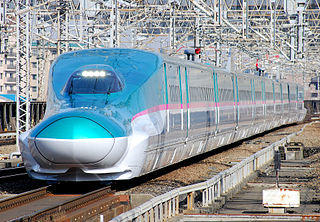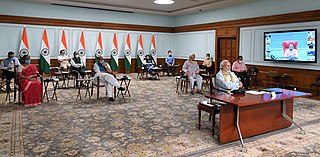
Virar is a coastal city in Palghar district, Maharashtra. The northern third of the city of Vasai-Virar, it is administered by Vasai-Virar Municipal Corporation. It lies to the south of Palghar district, and to the north of the city of Mumbai. It is an important part of Palghar District because Palghar is the outermost part of northern side of Mumbai Metropolitan Region and comes under police jurisdiction of Mira-Bhayander, Vasai-Virar Police Commissionerate.

Kshitij Thakur is an Indian politician, who served as a Member of Legislative Assembly from Bahujan Vikas Aghadi (BVA) representing Nalasopara constituency in the Maharashtra State Assembly, from 2009-2024..

Mumbai–Ahmedabad High Speed Rail Corridor (MAHSR) or Mumbai–Ahmedabad HSR is an under-construction high-speed rail line, which will connect Mumbai, the financial hub of India, with Ahmedabad, the largest city in the state of Gujarat. When completed, it will be India's first high-speed rail line, with a top speed of 320 km/h (200 mph).
The Western line of the Mumbai Suburban Railway is a public transit system serving Mumbai Metropolitan Region, Maharashtra. It consists of 37 stations from Dahanu Road to Churchgate railway station. It is operated by Western Railways (WR). The entire line is at grade.
The Delhi–Mumbai Expressway is a 1,350 km long, 8-lane wide under-construction access-controlled expressway connecting India's national capital New Delhi to its financial capital Mumbai. The foundation stone for the project was laid by union minister of Road Transport & Highways Nitin Gadkari in the presence of Sushma Swaraj and Arun Jaitley on 8 March 2019 and it was inaugurated by Prime Minister Narendra Modi. The total project value including the land acquisition cost is around ₹1,00,000 crores. It is expected to be completed by 2026.
Events in the year 2020 in India.
The COVID-19 pandemic in India is a part of the worldwide pandemic of coronavirus disease 2019 caused by severe acute respiratory syndrome coronavirus 2. As of 29 January 2025, according to Indian government figures, India has the second-highest number of confirmed cases in the world with 45,044,573 reported cases of COVID-19 infection and the third-highest number of COVID-19 deaths at 533,661 deaths. In October 2021, the World Health Organization estimated 4.7 million excess deaths, both directly and indirectly related to COVID-19 to have taken place in India.
The first case of the COVID-19 pandemic in the Indian state of Maharashtra was confirmed on 9 March 2020.

The following is the timeline of the COVID-19 pandemic in India from January 2020 through May 2020.

The COVID-19 pandemic was first confirmed in the Indian state of West Bengal on 17 March 2020 in Kolkata. The Health and Family Welfare department of Government of West Bengal has confirmed a total of 13,43,442 COVID-19 positive cases, including 1,09,806 active cases, 15,120 deaths and 12,18,516 recoveries, as of 28 May 2021.

The Indian state governments have responded to the COVID-19 pandemic in India with various declarations of emergency, closure of institutions and public meeting places, and other restrictions intended to contain the spread of the virus.

The first case of the COVID-19 pandemic in the Indian state of Assam was reported on 31 March 2020. As of 27 January 2025, the Government of Assam has confirmed a total of positive cases of COVID-19 including recoveries, three migrations and deaths in the state. The state's as well as northeast's largest city, Guwahati, has been worst affected by coronavirus.
On 19 December 2020, a fire at occurred at privately run Sanko University Hospital in Gaziantep, Turkey. It killed 13 people. The fire broke out in the intensive care unit which was treating COVID-19 patients. It started at 4:45am, caused by an oxygen cylinder exploding on the ward, while 19 patients were present. Hospital staff and firefights broke the windows of the intensive care unit, which allowed them to remove all the patients in the ward. Seven people died on the spot and six died while being transferred to another hospital. Fourteen people – eleven from the intensive care ward and three from other parts of the hospital – were transferred to other hospitals in the city to be treated for smoke inhalation.
Events in the year 2021 in India for real time basis.
On the night of 24 to 25 April 2021, a fire at the Ibn al-Khatib hospital in Baghdad, Iraq, left at least 82 people dead and 110 others injured. The fire was started by the explosion of oxygen tanks designated for COVID-19 patients. A lack of fire detection and suppression systems contributed to the spread of the fire, and many died as a result of being taken off their ventilators to escape. The disaster led to calls for accountability, and the Minister for Health, Hassan al-Tamimi, was suspended by Prime Minister Mustafa al-Kadhimi the following day.
On 1 May 2021, a fire in a hospital in Bharuch, Gujarat, India, killed at least 16 COVID-19 patients and 2 nurses.

The following is the timeline of the COVID-19 pandemic in India from January 2021 to the May 2021. The complexity of the COVID-19 data reporting in India has been scrutinized extensively because of the disagreement between the undocumented morbidity rate and the low rates of case fatality in comparison to other countries.

Extremely Severe Cyclonic Storm Tauktae was a powerful, deadly and damaging tropical cyclone in the Arabian Sea that became the strongest tropical cyclone to make landfall in the Indian state of Gujarat since the 1998 Gujarat cyclone and one of the strongest tropical cyclones to ever affect the west coast of India and above all It was the strongest storm of 2021 North Indian Ocean cyclone season. The second depression, first cyclonic storm, first severe cyclonic storm, first very severe cyclonic storm, and first extremely severe cyclonic storm of the 2021 North Indian Ocean cyclone season, Tauktae originated from an area of low pressure in the Arabian Sea, which was first monitored by the India Meteorological Department on May 13. The low drifted eastward and organized into a deep depression by May 14. The storm soon took a northward turn, continuing to gradually intensify because of warm waters near the coast, and the system strengthened into a cyclonic storm and was named Tauktae later that same day. Tauktae continued intensifying into May 15, reaching severe cyclonic storm status later that day. Tauktae began to parallel the coast of the Indian states of Kerala, Karnataka, Goa and Maharashtra, before rapidly intensifying into a very severe cyclonic storm, early on May 16. Early on May 17, Tauktae intensified into an extremely severe cyclonic storm, reaching its peak intensity soon afterward. Later that same day, Tauktae underwent an eyewall replacement cycle and weakened, before restrengthening as it neared the coast of Gujarat, making landfall soon afterward.







